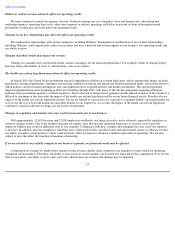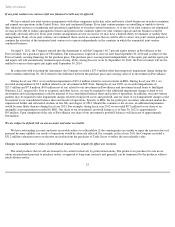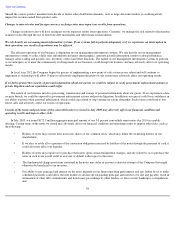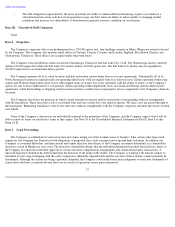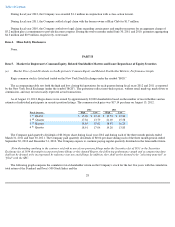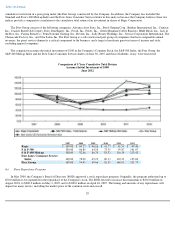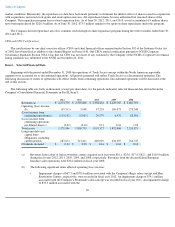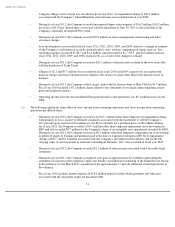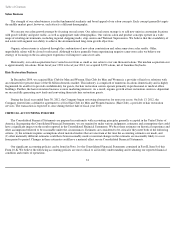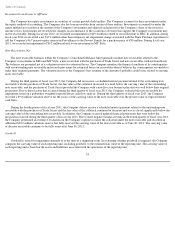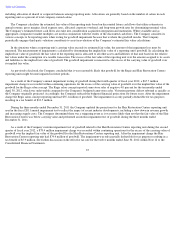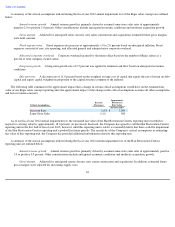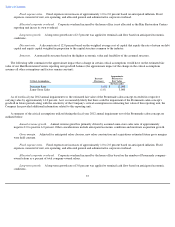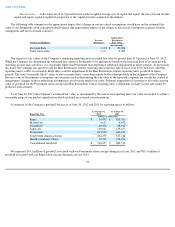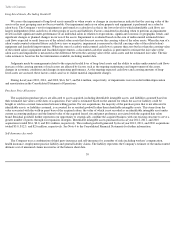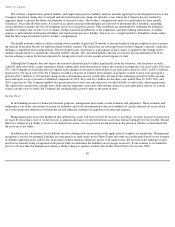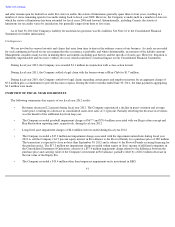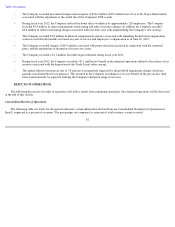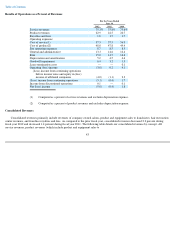Supercuts 2012 Annual Report Download - page 36
Download and view the complete annual report
Please find page 36 of the 2012 Supercuts annual report below. You can navigate through the pages in the report by either clicking on the pages listed below, or by using the keyword search tool below to find specific information within the annual report.
Table of Contents
Investment In and Loans to Affiliates
The Company has equity investments in securities of certain privately held entities. The Company accounts for these investments under
the equity method of accounting. The Company also has loan receivables from certain of these entities. Investments accounted for under the
equity method are recorded at the amount of the Company's investment and adjusted each period for the Company's share of the investee's
income or loss. Investments are reviewed for changes in circumstance or the occurrence of events that suggest the Company's investment may
not be recoverable. During fiscal year 2012, we recorded an impairment of $19.4 million related to our investment in EEG. In addition, during
fiscal year 2012 we recorded a net $17.2 million other than temporary net impairment charge associated with the Share Purchase Agreement to
sell the Company's 46.7 percent equity interest in Provalliance to the Provost Family for a purchase price of €80 million. During fiscal year
2011, we recorded an impairment of $9.2 million related to our investment in MY Style.
Note Receivables, Net
The note receivable balances within the Company's Consolidated Balance Sheet primarily include note receivables related to the
Company's investments in EEG and MY Style, a note receivable with the purchaser of Trade Secret and note receivables with our franchisees.
The balances are presented net of a valuation reserve for estimated losses. The Company monitors the financial condition of its counterparties
with an outstanding note receivable and records provisions for estimated losses on receivables when it believes the counterparties are unable to
make their required payments. The valuation reserve is the Company's best estimate of the amount of probable credit losses related to existing
notes receivable.
During the third quarter of fiscal year 2011, the Company did not receive a scheduled interest payment related to the outstanding note
receivable with the purchaser of Trade Secret, the fair value of the collateral decreased to a level below the carrying value of the outstanding
note receivable, and the purchaser of Trade Secret provided the Company with a new five year business plan that was well below their original
projections. Due to these factors that occurred during the third quarter of fiscal year 2011, the Company evaluated the note receivable for
impairment based on a probability weighted expected future cash flow analysis. During the third quarter of fiscal year 2011, the Company
recorded a $9.0 million valuation reserve for the excess of the carrying value of the note receivable over the present value of expected future
cash flows.
During the fourth quarter of fiscal year 2011, the Company did not receive a scheduled interest payment related to the outstanding note
receivable with the purchaser of Trade Secret and the fair value of the collateral continued to decrease and was at a level significantly below the
carrying value of the outstanding note receivable. In addition, the Company received updated financial projections that were below the
projections received during the third quarter of fiscal year 2011. Due to these negative financial events in the fourth quarter of fiscal year 2011,
the Company performed an extensive evaluation on the Company's option to realize the collateral under the note receivable and recorded an
additional $22.2 million valuation reserve that fully reserved the carrying value of the note receivable as of June 30, 2011. The carrying value
of the note receivable continues to be fully reserved at June 30, 2012.
Goodwill
Goodwill is tested for impairment annually or at the time of a triggering event. In evaluating whether goodwill is impaired, the Company
compares the carrying value of each reporting unit, including goodwill, to the estimated fair value of the reporting unit. The carrying value of
each reporting unit is based on the assets and liabilities associated with the operations of the reporting unit,
34


